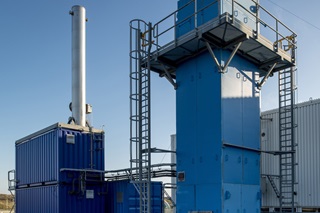Revolutionising Energy: Dimeta's Role in Renewable Fuel Projects

The BUTTERFLY project aims to pioneer an innovative co-production process using cutting-edge technologies harnessing the potential of sustainable biogenic and non-biogenic feedstocks to produce DME and Synthetic Natural Gas (SNG). The project is led by TNO and funded by the European Commission's Horizon programme.
By integrating ENGIE's state-of-the-art gasification plant (GAYA) with TNO's proprietary DME production plant (SEDMES), the project targets the off-grid energy supply, the steel industry and the heavy transportation sector.
BUTTERFLY's ambitions extend beyond innovation by demonstrating co-production from indirect gasification in an industrial environment and preparing the SEDMES unit downstream at GAYA's site in France. In addition, BUTTERFLY will intend to de-risk large-scale demonstration through lab-scale R&D modelling and implement a Digital Twin of the conversion process controlled by AI.
Led by TNO and funded by RVO, part of the Dutch Ministry of Economic Affairs and Climate, the POWERED project (MOOI22) consists of a diverse consortium from CO2-heavy industries like Tata Steel and Aramco to technology providers like Technip and VDL, as well as Shell as a contributor. This shows the collective commitment to accelerating the adoption of renewable fuels across sectors. The project aims to further the development of TNO's SEDMES technology which produces renewable & recycled carbon DME in a single step. By removing water in situ, the sorption-enhanced reactor enhances the conversion process, making it up to 15 times more efficient.
This project marks a significant step towards reducing the reliance on fossil fuels and mitigating the environmental impact of traditional energy sources. The potential applications of DME vary from transportation fuels to serving as fuel for domestic and industrial heating in the off-grid energy sector, even contributing to the chemicals sector. The versatility of DME opens doors to many opportunities for sustainable growth and development.
As both projects progress over the coming four years, they exemplify the power of collaboration, innovation and shared vision in driving meaningful change. The consortiums pave the way for a more sustainable future by pushing the boundaries of renewable fuel production.
Dimeta's participation focuses on providing storage solutions for the produced DME, facilitating trials and testing with potential end-users, and conducting crucial policy and sustainability assessments. Together with other consortium members, Dimeta's contributions are fundamental in driving the project forward and ensuring its success.

"We are proud to be part of both consortiums and develop DME production routes and enable access to decarbonisation for everyone."
Frankie Ugboma, CEO, Dimeta